|
Books Should Be Free Loyal Books Free Public Domain Audiobooks & eBook Downloads |
|
|
Books Should Be Free Loyal Books Free Public Domain Audiobooks & eBook Downloads |
|
Books on Politics |
|---|
|
Book type:
Sort by:
View by:
|
By: John R. Lynch (1847-1939) | |
|---|---|
 The Facts of Reconstruction
The Facts of Reconstruction
After the American Civil War, John R. Lynch, who had been a slave in Mississippi, began his political career in 1869 by first becoming Justice of the Peace, and then Mississippi State Representative. He was only 26 when he was elected to the US Congress in 1873. There, he continued to be an activist, introducing many bills and arguing on their behalf. Perhaps his greatest effort was in the long debate supporting the Civil Rights Act of 1875 to ban discrimination in public accommodations.In 1884 Lynch was the first African American nominated after a moving speech by Theodore Roosevelt to the position of Temporary Chairman of the Republican National Convention in Chicago, Illinois... | |
By: John Relly Beard (1800-1876) | |
|---|---|
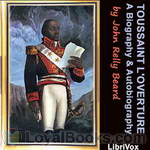 Toussaint L’Ouverture: A Biography and Autobiography
Toussaint L’Ouverture: A Biography and Autobiography
François-Dominique Toussaint L’Ouverture (1743-1803) rose to fame in 1791 during the Haitian struggle for independence. In this revolt, he led thousands of slaves on the island of Hispañola to fight against the colonial European powers of France, Spain and England. The former slaves ultimately established the independent state of Haiti and expelled the Europeans. L’Ouverture eventually became the governor and Commander-In-Chief of Haiti before recognizing and submitting to French rule in 1801... | |
 Toussaint L’Ouverture: A Biography and Autobiography
Toussaint L’Ouverture: A Biography and Autobiography
François-Dominique Toussaint L’Ouverture (1743-1803) rose to fame in 1791 during the Haitian struggle for independence. In this revolt, he led thousands of slaves on the island of Hispañola to fight against the colonial European powers of France, Spain and England. The former slaves ultimately established the independent state of Haiti and expelled the Europeans. L’Ouverture eventually became the governor and Commander-In-Chief of Haiti before recognizing and submitting to French rule in 1801... | |
By: John Richard Meader | |
|---|---|
 Your Pay Envelope
Your Pay Envelope
A Critique of Classical Socialism presented in a series of letters to a Mr. Smith. The author was the editor of the New York-based "Common Cause" magazine - Summary by KevinS | |
By: John Ruskin (1819-1900) | |
|---|---|
 Unto this Last: Four Essays on the First Principles of Political Economy
Unto this Last: Four Essays on the First Principles of Political Economy
John Ruskin (1819 – 1900) is best known for his work as an art critic and social critic, but is remembered as an author, poet and artist as well. Unto This Last is an important work of political economic though that influenced Gandhi, among others. (Hugh McGuire/Wikipedia) | |
By: John Stuart Mill (1806-1873) | |
|---|---|
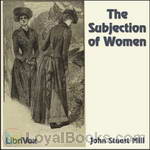 The Subjection of Women
The Subjection of Women
The Subjection of Women is the title of an essay written by John Stuart Mill in 1869, possibly jointly with his wife Harriet Taylor Mill, stating an argument in favor of equality between the sexes. It offers both detailed argumentation and passionate eloquence in opposition to the social and legal inequalities commonly imposed upon women by a patriarchal culture. Just as in “On Liberty,” Mill defends the emancipation of women on utilitarian grounds, convinced that the moral and intellectual advancement of women would result in greater happiness for everybody. | |
 Considerations on Representative Government
Considerations on Representative Government
Mill's volume was published in 1861 as an argument favoring this form of governance. Mill covers what forms of government work best, including when representative government is applicable and when not. He details appropriate functions of representative bodies and warns of problems to avoid. He distinguishes between true and false democracy. Other areas covered include how voting is carried out, the role of a second chamber in Parliament, and how an executive branch might function. | |
By: José Rizal (1861-1896) | |
|---|---|
 Noli Me Tangere (The Social Cancer)
Noli Me Tangere (The Social Cancer)
Noli Me Tangere (Latin for Touch Me Not) is a novel by the National Hero of the Philippines, Dr. José Rizal. It was originally written in Spanish, and first published in Germany in 1887. Noli Me Tangere exposed the corruption and abuse of the Spanish government and clergy towards the Philippine people and the ills of the Philippine society. This novel, and its sequel El Filibusterismo were banned in many parts of the Islands. Rizal was later arrested for inciting rebellion, based largely on his writings, and was excuted in Manila... | |
By: Josiah Priest (1788-1851) | |
|---|---|
 Bible Defence of Slavery
Bible Defence of Slavery
The full title of this book is Bible Defense of Slavery; and Origin, Fortunes, and History of the Negro Race, by Rev. Josiah Priest, A. M. 5th edition. This is a compilation of pro-slavery literature and propaganda that went through numerous editions in the Southern United States before the Civil War. It contains the highly influential book, Slavery, as it Relates to the Negro, or African Race, by Rev Josiah Priest, which was originally published in 1843. This compilation also includes many essays and favorable reviews of Rev Priest’s book from contemporary magazines and newspapers, and written endorsements from national politicians... | |
By: Justin McCarthy (1830-1912) | |
|---|---|
 History of the Four Georges and of William IV, Volume 3
History of the Four Georges and of William IV, Volume 3
In Volume III of this series on the Hanoverian Kings, Justin McCarthy is joined by his son, Justin Hartly McCarthy, a liberal Irish MP like his father. Together they bring to life, poor stubborn George III, the outrageous radical, John Wilkes, the rebellious American Colonies, great-hearted Charles James Fox, the Gordon Riots which set London ablaze, Edmund Burke, Britain's problematic Indian policy, and the brave, enigmatic Younger Pitt, who faced national fears of the spread of revolution across the Channel from France and then confronted the imminent threat of invasion by the armies of Napoleon. | |
 History of Our Own Times From the Accession of Queen Victoria to the General Election of 1880, Volume I
History of Our Own Times From the Accession of Queen Victoria to the General Election of 1880, Volume I
An engaging history of Great Britain in the heyday of Queen Victoria and of her empire by the liberal Irish Member of Parliament, Justin McCarthy. He brings us the larger than life personalities of the day, Victoria and Albert, Russell and Peel, O'Connell and Palmerston, Gladstone and Disraeli, and relates great events, the Afghan War, the Irish famine, and the Crimean War without ever losing sight of the hopes and fears of the common people at home and abroad. | |
 History of Our Own Times From the Accession of Queen Victoria to the General Election of 1880, Volume II
History of Our Own Times From the Accession of Queen Victoria to the General Election of 1880, Volume II
Volume II of this popular history opens in the revolutionary year, 1848, with the Chartist movement for manhood suffrage and with the rise of Young Ireland. Next we join the crowds in 1851 at the opening of the Great Exhibition in Hyde Park, of which Queen Victoria wrote, ''A little rain fell just as we started, but before we came near the Crystal Palace the sun shone and gleamed upon the gigantic edifice, upon which the flags of all nations were floating.'' Hopes for a new era of peace expired in... | |
 History of Our Own Times From the Accession of Queen Victoria to the General Election of 1880, Volume III
History of Our Own Times From the Accession of Queen Victoria to the General Election of 1880, Volume III
Volume III of this history of Victorian Britain begins in 1856 with the gunboat diplomacy of the Second Opium War and then moves to the harrowing days of the Indian Rebellion of 1857. In June 1858, Benjamin Disraeli secures passage of the Jews Relief Act and Baron Lionel Nathan de Rothschild takes his seat in Parliament. Prince Albert dies after a short illness in December 1861, leaving a distraught and cloistered Queen. Lord Palmerston's diplomacy increases Britain's influence on the Continent, while the Civil War in America divides the country in surprising ways. Bismarck emerges and Prussia begins her ascent to power. | |
 History of Our Own Times From the Accession of Queen Victoria to the General Election of 1880, Volume IV
History of Our Own Times From the Accession of Queen Victoria to the General Election of 1880, Volume IV
The fourth and concluding volume of this history of Victorian Britain opens with the brutal repression in 1865 of a rebellion by ex-slaves in Jamaica. Then in 1867, the Conservative Prime Minister, Benjamin Disraeli, takes his celebrated "leap in the dark" with the passage of the most comprehensive expansion of manhood suffrage in British history. The Fenian movement agitates unsuccessfully for Irish independence. British trade unions win the right to organize. William Ewart Gladstone launches his great reform ministry by abolishing in Ireland the hated Anglican establishment and follows with a flood of bills reforming education, the British army, and poor relief... | |
By: Karl Marx | |
|---|---|
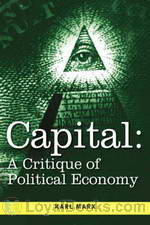 Capital: A Critical Analysis of Capitalist Production
Capital: A Critical Analysis of Capitalist Production
Karl Marx’s Capital: A Critical Analysis of Capitalist Production is a critical analysis of the political economy or the capitalist system. In this 3 volume work, he says that a capitalist economy can only survive by exploiting the working class. The concepts discussed in this book laid the foundations of the political doctrine that would later be known as communism. This book has three volumes, the first volume is Marx’s critical analysis of the capitalist mode of production and how it’s effects on poor people... | |
 Wage-Labour and Capital
Wage-Labour and Capital
Orignally written as a series of newspaper articles in 1847, Wage-Labour and Capital was intended to give a short overview, for popular consumption, of Marx’s central threories regarding the economic relationships between workers and capitalists. These theories outlined include the Marxian form of the Labour Theory of Value, which distinguishes “labour” from “labour-power”, and the Theory of Concentration of Capital, which states that capitalism tends towards the creation of monopolies and the disenfranchisement of the middle and working classes... | |
 Eleven Theses on Feuerbach
Eleven Theses on Feuerbach
The “Theses on Feuerbach” are eleven short philosophical notes written by Karl Marx in 1845. They outline a critique of the ideas of Marx’s fellow Young Hegelian philosopher Ludwig Feuerbach. The theses form a basis for the activism emphasised by Marx’s work, and this short text is perhaps best know for its ending – a Eureka for revolutionary socialism. The theses were written in 1845, but not published until 1888 (five years after Marx’s death), with slight modifications by Friedrich Engels. The original text was published in 1924. This translation is based on the 1888 version. | |
 Contribution to the Critique of Political Economy
Contribution to the Critique of Political Economy
As a precursor to Capital, Marx outlines his analysis of capitalism and critiques classical economic theories. - Summary by Tray | |
By: Katherine Thurston (1875-1911) | |
|---|---|
 The Masquerader
The Masquerader
The Masquerader is one of two Katherine Cecil Thurston’s books that appeared on the Publisher’s Weekly best-sellers list in 1905. The Masquerader is part mystery, part romance and part political thriller – all tied up in one neat package. Nature has a way of sometimes making two people nearly indistinguishable in appearance. Such is the premise for this book. John Chilcote, a British politician, and John Loder, a man down on his luck meet by accident one night during one of London’s worst fogs... | |
By: Las Cortes y el Pueblo Español | |
|---|---|
 Constitución Española de 1978
Constitución Española de 1978
Constitución vigente en España actualmente, fruto de la Transición a la democracia tras la muerte de Francisco Franco. (Introducción por AGV) | |
By: Leo Tolstoy (1828-1910) | |
|---|---|
 The Kingdom of God is within you
The Kingdom of God is within you
The title of the book comes from Luke 17:21. It is a non-fiction work of the famous Russian author Leo Tolstoy. He wrote it after many years of reflexion on Christianity and Jesus. Many subjects are present such as wars, non-violence, misunderstanding by believers of the faith, etc. | |
 The Slavery of Our Times
The Slavery of Our Times
This little book shows, in a short, clear, and systematic manner, how the principle of Non-Resistance, about which Tolstoy has written so much, is related to economic and political life. | |
 Bethink Yourselves!
Bethink Yourselves!
As Russia goes to war against Japan, Tolstoy urges those at all levels of society, from the Tsar down to the common soldier, to consider their actions in the light of Christ's teaching. "However strange this may appear, the most effective and certain deliverance of men from all the calamities which they inflict upon themselves and from the most dreadful of all—war—is attainable, not by any external general measures, but merely by that simple appeal to the consciousness of each separate man which, nineteen hundred years ago, was proposed by Jesus—that every man bethink himself, and ask himself, who is he, why he lives, and what he should and should not do... | |
 What Shall We Do?
What Shall We Do?
A vivid description of wealth and poverty in Russia in Tolstoy's day, an inquiry into the root causes of economic inequality, and a vision of a more just way of living.Tolstoy recounts his own disturbing encounters with extreme poverty in Moscow, his initial idea of making the problem disappear by generous financial contributions, and his subsequent realization that the problem of poverty was much more intractable than he had imagined. He concludes that poverty is fundamentally linked with the luxurious lifestyle to which he and his class were accustomed, and that both are detrimental both to the rich and to the poor... | |
By: Louise DeKoven Bowen (1859-1953) | |
|---|---|
 Colored People of Chicago
Colored People of Chicago
This book presents a summary of the findings conducted by the the Juvenile Protective Association in Chicago before the changes brought on by the war-time economy. The study's researchers were A. P. Drucker, Sophia Boaz, A. L. Harris, and Miriam Schaffner. Its author, Louise DeKoven Bowen was a well-known philanthropist and suffragist in Chicago. The summary makes no strong argument on its own, but presents simple facts and observations that would alert the reader to the need for social and economic reform in the city. - Summary by KevinS | |
By: Marcus Tullius Cicero | |
|---|---|
 The Philippics
The Philippics
A philippic is a fiery, damning speech delivered to condemn a particular political actor. The term originates with Demosthenes, who delivered an attack on Philip II of Macedon in the 4th century BCE.Cicero consciously modeled his own attacks on Mark Antony, in 44 BC and 43 BC, on Demosthenes’s speeches, and if the correspondence between M. Brutus and Cicero are genuine [ad Brut. ii 3.4, ii 4.2], at least the fifth and seventh speeches were referred to as the Philippics in Cicero’s time. They were also called the Antonian Orations by Aulus Gellius... | |
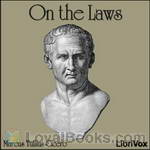 On the Laws
On the Laws
De Legibus (On the Laws) is a philosophical dialogue between: Cicero's friend Titus Pomponius Atticus; Cicero's brother Quintus; and Cicero himself. The dialogue is written in the style of Plato who was greatly revered by Cicero. De Legibus forms a continuation of Cicero's own work De re Publica (On the Commonwealth or On the Republic) and is also a response to Plato's work Νόμοι (Laws). It is unknown how many books the work originally contained but several complete books have been lost. Cicero's... | |
By: Margaret Fuller (1810-1850) | |
|---|---|
 Woman in the Nineteenth Century and Kindred Papers Relating to the Sphere, Condition, and Duties of Women
Woman in the Nineteenth Century and Kindred Papers Relating to the Sphere, Condition, and Duties of Women
Margaret Fuller (1810-1850) was an American feminist, writer, and intellectual associated with the Transcendentalist movement. Her book Woman in the Nineteenth Century (1845) is considered the first major feminist work in the United States. Her life was short but full. She became the first editor of the transcendentalist journal The Dial in 1840, before joining the staff of the New York Tribune under Horace Greeley in 1844. By the time she was in her 30s, Fuller had earned a reputation as the best-read person in New England, male or female, and became the first woman allowed to use the library at Harvard College... | |
By: Margaret Sanger (1879-1966) | |
|---|---|
 Woman and the New Race
Woman and the New Race
Margaret Sanger was an American sex educator and nurse who became one of the leading birth control activists of her time, having at one point, even served jail time for importing birth control pills, then illegal, into the United States. Woman and the New Race is her treatise on how the control of population size would not only free women from the bondage of forced motherhood, but would elevate all of society. The original fight for birth control was closely tied to the labor movement as well as the Eugenics movement, and her book provides fascinating insight to a mostly-forgotten turbulent battle recently fought in American history. | |
By: Maria W. Stewart (1803-1879) | |
|---|---|
 Meditations from the Pen
Meditations from the Pen
Maria W. Stewart was America's first black woman political writer. Between 1831 and 1833, she gave four speeches on the topics of slavery and women's rights. Meditations From The Pen of Mrs. Maria W. Stewart—published in 1879 shortly before her death—is a collection of those speeches as well as her memoir, some meditations and prayers. They are political, poetical and sermon all at the same time; but in the mileu in which she lectured, they were a critically important part of the abolitionist movement years before the contributions of others such as Frederick Douglass and Sojourner Truth... | |
By: Marie Sukloff (1885-) | |
|---|---|
 Life-Story of a Russian Exile
Life-Story of a Russian Exile
Hero or assassin? Victim or criminal? Marie Sukloff fits no easy category. A young peasant woman who became a political radical and activist, Sukloff carried out an assassination plot against a Russian governor known for murderous pogroms and rampages against the Jews of his province. This mesmerizing autobiographical account tells the story of Sukloff's peasant childhood, radicalization, direct action, exile to Siberia, and escape. She tells her story with a colorful verve, sincerity, intensity, and simplicity that makes it almost impossible to put down, raising questions of political philosophy and responsibility that challenge the complacency of every reader. | |
By: Mark Twain (1835-1910) | |
|---|---|
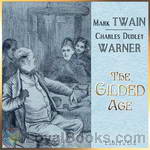 The Gilded Age, A Tale of Today
The Gilded Age, A Tale of Today
The Gilded Age: A Tale of Today is an 1873 novel by Mark Twain and Charles Dudley Warner that satirizes greed and political corruption in post-Civil War America. The term gilded age, commonly given to the era, comes from the title of this book. Twain and Warner got the name from Shakespeare's King John (1595): "To gild refined gold, to paint the lily... is wasteful and ridiculous excess." Gilding a lily, which is already beautiful and not in need of further adornment, is excessive and wasteful, characteristics of the age Twain and Warner wrote about in their novel... | |